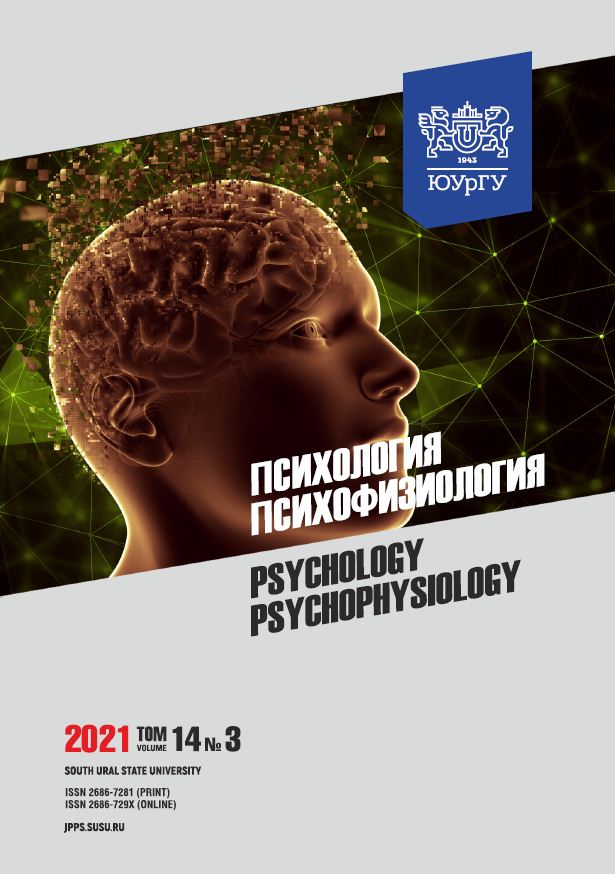EMOTIONAL INTELLIGENCE AS A RESOURCE FOR CREATIVE LEADERSHIP
Abstract
Abstract. The article shows the individual psychological characteristics of female participants in a weight loss program and determines their level of compliance. Background: People who are interested in body weight loss consider overweight as their main problem, although often overweight is only a result of misbalance in other areas of their lives, which leads to overeating. Therefore, attempts to lose weight often do not have a lasting effect. Aim. The paper aims to find the individual psychological characteristics and the level of compliance among women who have addressed for specialized help. Materials and methods. A study of 142 women aged 20–60 years was conducted (average age – 41.5 years). 3 groups were compared: women with BMI > 25 seeking help from weight loss experts (n = 42); women with BMI > 25 who did not seek help (n = 47); women with BMI under 25 who did not seek help (n = 53). The following methods were used: Dutch Eating Behavior Questionnaire (DEBQ), Eating Disorder Examination Questionnaire (EDE-Q), Barratt Impulsiveness Scale (BIS-11), Emotion Regulation Questionnaire (ERQ), Cognitive Emotion Regulation Questionnaire (CERQ), Hospital Anxiety and Depression Scale (HADS), Big-Five factor markers (BFFM). Results. It was found that women who asked for help weight loss experts were concerned about their body shape and demonstrated more pronounced eating disorders and higher impulsivity than women of other groups, while their compliance was lower than that of women with a BMI of up to 25. The level of compliance in the group of women who sought help from experts increased for six months and then began to decline. Conclusion: Women with psychogenic overeating are concerned about their body shape, have pronounced eating disorders and are characterized by higher impulsivity and compliance.
Downloads
References
2. Stewart S.F., Ogden J. The Role of BMI Group on the Impact of Weight Bias Versus Body Positivity Terminology on Behavioral Intentions and Beliefs: An Experimental Study. Frontiers in psychology. 2019; 10: 634. DOI: 10.3389/fpsyg.2019.00634.
3. Thedinga H., Zehl R., Thiel A. Weight stigma experiences and self-exclusion from sport and exercise settings among people with obesity. BMC Public Health. 2020; 21: 656. DOI: 10.1186/s12889-021-10565-7.
4. Anderson L., Berg H., Brown T., Menzel J., Reilly E. The Role of Disgust in Eating Disorders. Current Psychiatry Reports. 2021; 23 (2): 4. DOI: 10.1007/s11920-020-01217-5.
5. Schwenke M., Luppa M., Pabst A. et al. Attitudes and treatment practice of general practitioners towards patients with obesity in primary care. BMC Family Practice. 2020; 21: 169. DOI: 10.1186/s12875-020-01239-1.
6. Thiel A., John J., Carl J., Thedinga H. Weight Stigma Experiences and Physical (In)activity: A Biographical Analysis. Obesity Facts. 2020; 13: 1–17. DOI: 10.1159/000507936.
7. Samsonova G.O., Yazykova T.A., Agasarov L.G. Psychological aspects of alimentary obesity (literature review). Vestnik novykh meditsinskikh tekhnologii = Journal of New Medical Technologies. 2018; 12 (3): 133–139. (in Russ.). DOI: 10.24411/2075-4094-2018-16027.
8. Leung A.W.Y., Chan R.S.M., Sea M.M.M., Woo J. An Overview of Factors Associated with Adherence to Lifestyle Modification Programs for Weight Management in Adults. Interna-tional Journal of Environmental Research and Public Health. 2017: 14 (8): 922. DOI: 10.3390/ijerph14080922.
9. Savchikova Yu.L. Personal Features of Women with Overweight. Mezhdunarodnyy meditsinskiy zhurnal = International Medical Journal. 2004; 10 (3): 83–87. (in Russ.). http://www.imj.kh.ua/ archive/issue/2004/3
10. Braden A., OBrien W. Pilot Study of a Treatment Using Dialectical Behavioral Therapy Skills for Adults with Overweight/Obesity and Emotional Eating. Journal of Contemporary Psychotherapy. 2021; 51: 21–29. DOI: 10.1007/s10879-020-09477-1.
11. Frayn M., Knäuper B. Emotional Eating and Weight in Adults: a Review. Current Psychology. 2018; 37: 924–933. DOI: 10.1007/s12144-017-9577-9.
12. Bobrov A.E., Gegel N.V., Gurova O.Yu. et al. Behavioral peculiarities in patients with surplus body mass and obesity. Almanakh klinicheskoi meditsiny = Almanac of Clinical Medicine. 2014;
32: 3–7. (in Russ.). DOI: 10.18786/2072-0505-2014-32-3-7.
13. Uspenskii Yu.P., Fominykh Yu.A., Pustovit E.V. Etiopathogenetic basis for the use of antidepressants in a complex treatment of patients with metabolic syndrome. Eksperimentalnaya i klinicheskaya gastroenterologiya = Experimental & clinical gastroenterology. 2017; 7 (143): 146–150.
(in Russ.). https://elibrary.ru/item.asp?id = 30507334.
14. Colomer L., Anmella G., Vieta E., Grande I. Physical health in affective disorders: a narrative review of the literature. Brazilian Journal of Psychiatry. 2020. DOI: 10.1590/1516-4446-2020-1246.
15. Weiss F., Barbuti M., Carignani G. et al. Psychiatric Aspects of Obesity: A Narrative Review of Pathophysiology and Psychopathology. Journal of Clinical Medicine. 2020; 9 (8): 2344. DOI: 10.3390/jcm9082344.
16. Patist C.M., Stapelberg N.J.C., Du Toit E.F., Headrick J.P. The brain-adipocytegut network: Linking obesity and depression subtypes. Cognitive, Affective, & Behavioral Neuroscience. 2018; 18: 1121–1144. DOI: 10.3758/s13415-018-0626-0.
17. Dingemans A., Danner U., Parks M. Emotion Regulation in Binge Eating Disorder: A Review. Nutrients. 2017; 9 (11): 1274. DOI: 10.3390/nu9111274.
18. Casagrande M., Boncompagni I., Forte G. et al. Emotion and overeating behavior: effects of alexithymia and emotional regulation on overweight and obesity. Eating and Weight Disorders. 2020; 25: 1333–1345. DOI: 10.1007/s40519-019-00767-9.
19. Van Strien T., Frijters J.E.R., Bergers G.P.A., Defares P.B. The Dutch Eating Behavior Questionnaire (DEBQ) for assessment of restrained, emotional, and external eating behavior. International Journal of Eating Disorders. 1986; 5 (2): 295–315. DOI: 10.1002/1098-108X(198602)5:2<295::AID-EAT2260050209>3.0.CO;2-T.
20. Enikolopov S.N., Medvedeva T.I. Approbation of the Russian-language version of the Barratt Impulsiveness Scale (BIS-11). Psikhologiya i pravo = Psychology and Law. 2015; 5 (3); 75–89. (in Russ.). DOI: 10.17759/psylaw.2015050307.
21. Knyazev G.G., Mitrofanova L.G., Bocharov V.A. Validization of Russian version of Goldbergs “Big-Five Factor Markers”. Psikhologicheskii zhurnal = Psychological Journal. 2010; 31 (5): 100–110. (in Russ.). https://elibrary.ru/item.asp?id = 15192498.
22. Fontalova N.S., Shishkina A.O., Fontalov R.N. Socio-psychological features of people with different degree of overweight. Baikal Research Journal. 2017; 1: 28. (in Russ.). DOI: 10.17150/2411-6262.2017.8(1).28
References on translit
-Copyright (c) 2022 Psychology. Psychophysiology

This work is licensed under a Creative Commons Attribution-NonCommercial-NoDerivatives 4.0 International License.



